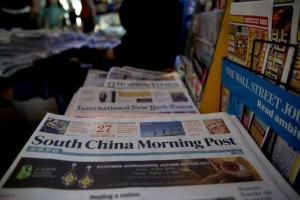2015-12-03
 Copies of the South China Morning Post, believed to be a target for a takeover by Chinese Internet tycoon Jack Ma of Alibaba, are displayed for sale at a newsstand in Hong Kong, on Nov. 28, 2015.
Copies of the South China Morning Post, believed to be a target for a takeover by Chinese Internet tycoon Jack Ma of Alibaba, are displayed for sale at a newsstand in Hong Kong, on Nov. 28, 2015.
AFP
Chinese internet company Alibaba is reportedly in discussions to buy a controlling stake in Hong Kong’s largest English-language newspaper, the South China Morning Post (SCMP), according to a number of recent media reports.
Sources have told Reuters and the Wall Street Journal that a potential deal is in the offing between the paper’s current owner, Malaysian tycoon Robert Kuok and the Chinese e-commerce giant, while Quartz reported on Thursday that a merger agreement will be signed before Christmas.
If confirmed, the deal will mark a further foray by mainland Chinese investors into the Hong Kong media and publishing sector, sparking further fears that Beijing is seeking yet more ideological control over the city in the wake of the Occupy Central pro-democracy movement last year.
Chinese control over Hong Kong media outlets isn’t new.
Hong Kong Economic Journal columnist Lai Chak Fun said Chinese corporate entities have been slowly taking over Hong Kong media outlets since the 1997 handover.
“In television now, the biggest shareholder of Television Broadcasts Ltd (TVB) is a Communist Party supporter,” Lai said, adding that he sees no reason why the deal shouldn’t go ahead.
Marked change
But he said a marked change appears to have taken place in recent years.
“[The Alibaba bid] would never have happened during the British colonial era, and it would never have happened openly during the administration of [post-handover chief executive] Tung Chee-hwa,” he said.
“But now, the Communist Party does whatever it likes in Hong Kong.”
He said Beijing is keen to get to a point where it can manipulate the whole of Hong Kong’s once free-wheeling media.
Hong Kong publisher Wu Yisan said the process of assimilation of Hong Kong media organizations began as early as the 1990s, with the acquisition of the Singtao Daily and the Ming Pao by Beijing-friendly investors.
“I think that there are probably some political considerations involved in the control of [an] English language media organization … in Hong Kong,” he said.
“Another factor is the worsening environment for print media in Hong Kong; this is probably a commercial decision to sell,” he said.
China’s propaganda plan
But he said the move is also in line with the ruling Chinese Communist Party’s global strategy.
“China has spent a good deal of money on acquiring media organizations all over the world,” Wu said. “This is all part of its overall propaganda plan for the rest of the world.”
Last month, Reuters reported that at least 33 radio stations in 14 countries now form part of a global web of radio station ownership structured so as to obscure its majority shareholder: state-run China Radio International, or CRI.
The stations broadcast content created or supplied by CRI or its foreign subsidiaries from Finland to Nepal to Australia, and from Philadelphia to San Francisco, the report said.
Former Beijing university journalism professor Jiao Guobiao said that the effect of any forthcoming deal may not be totally negative, however.
“I’m sure there is an element of … wanting to control the people in acquiring a newspaper, but in terms of digging up better stories, it could get better [for the paper],” Jiao said, without elaborating on how that might happen.
“What sort of control will Alibaba actually exert over the SCMP in the future? We can’t know that yet, not at all.”
Speculating on that future, former SCMP journalist and China analyst Willy Lam said that the Post under Alibaba ownership is likely to get politically closer to Beijing.
“At the same time, the Post’s influence in the Asia Pacific region could help to project China’s soft power in the region,” Lam wrote in a commentary on the reported takeover in Hong Kong’s Economic Journal.
Lam also said he expects Beijing’s “rectification” campaign aimed at bringing the Hong Kong media to heel to destroy the city’s once-vibrant independent publishing sector, citing the detention of Gui Minhai, whose Sage Communications publishing house is well-known for its books that comment or speculate on events in the corridors of power in Beijing.
“Clearly, Gui Minhai, who we hear was planning a book highly critical of Xi Jinping, had transgressed in a big way,” Lam wrote.
Sage’s owner Gui Minhai, its general manager Lu Bo, store manager Lin Rongji, and staff member Zhang Zhiping are believed to be in police custody in China after having been detained there or in Thailand, their associates told RFA in October.
Gui isn’t the first publisher to be targeted, either. In May 2014, a court in the southern Chinese city of Shenzhen handed a 10-year jail term to 79-year-old Hong Kong publisher Yiu Man-tin after he edited a book highly critical of President Xi Jinping.
Earlier this year, Beijing’s representative office in Hong Kong bought up a key publishing house, Sino United, which owns a chain of bookstores in the city.
The liaison office already owns a number of Chinese-language media, including the Wen Wei Po, Ta Kung Pao and Hong Kong Commercial Daily newspapers, as well as the online Orange News.
For detail please visit here
